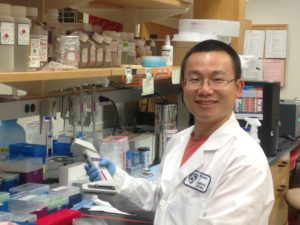Shirong Liu, MD, PhD, Instructor
Email: sliu22 (at) bwh (dot) Harvard (dot) edu
Education and training:
Bachelor of Medicine (MD equiv.), Jiangxi Medical College, Nanchang, China 2001
M.Sc. in Immunology, Peking Union Medical College, Beijing, China 2006
Dr. rer nat (PhD) in Neuroimmunology, Saarland University, Homburg/Saar, Germany 2011
Postdoc, Brigham and Women’s Hospital, Harvard Medical School, Boston, USA 2012-2016
Positions:
Residency, Zongrui Hospital (Beilun Hospital), Ningbo, China 2001-2003
Instructor in Neurology, Brigham and Women’s Hospital, Harvard Medical School, Boston, USA 2016-
Research area:
Dr. Liu was the first to discover functional microRNAs in the gut lumen and feces of mouse and human. He is interested in the host-microbe interactions, particularly, how the host evolves with the symbionts in/on it, how the symbionts were specifically selected for specific hosts, and the symbiosis’ role in host physiology and pathology in the autoimmune and neurodegenerative diseases such as multiple sclerosis and Alzheimer’s disease. He is also interested in the functions of non-coding RNAs found in the gut during health and diseases. He is exploring diagnostic and therapeutic strategies using his findings in microbiome and microRNA for diseases like multiple sclerosis.
Publications:
- Liu S, He W. (2006). Sumoylation-A Multifunctional Post-translational Protein Modification. Journal of Medical Molecular Biology, 3(3), 212-215.
- Kang N, Duan L, Tang L, Liu S, Li C, Li Y, Liu Q, Hu Y, Cui L, He W.(2008). Identification and characterization of a novel thymus aging related protein Rwdd1. Cellular & molecular immunology, 5 (4), 279-285.
- Kang N, Chen D, Wang L, Duan L, Liu S, Tang L, Liu Q, Cui L, He W. (2008). Rwdd1, a thymus aging related molecule, is a new member of the intrinsically unstructured protein family. Cellular & molecular immunology, 5 (5), 333-339.
- Liu Y, Hao W, Dawson A, Liu S, Fassbender K. (2009). Expression of amyotrophic lateral sclerosis-linked SOD1 mutant increases the neurotoxic potential of microglia via TLR2. The Journal of Biological Chemistry, 284(6), 3691-3699.
- Hao W, Liu Y, Liu S, Walter S, Grimm MO, Kiliaan AJ, Penke B, Hartmann T, Rübe CE, Menger MD, Fassbender K. (2011). Myeloid differentiation factor 88-deficient bone marrow cells improve Alzheimer’s disease-related symptoms and pathology. Brain, 134(1), 278-292.
- Liu S, Liu Y, Hao W, Wolf L, Kiliaan AJ, Penke B, Rübe CE, Walter J, Heneka MT, Hartmann T, Menger MD, Fassbender K. (2012). TLR2 is a primary receptor for Alzheimer’s amyloid peptide to trigger neuroinflammatory activation. The Journal of Immunology, 188(3), 1098-1107.
- Rezende R, da Cunha A, Kuhn C, Rubino S, M’Hamdi H, Gabriely G, Vandeventer T, Liu S, Cialic R, Rosa N, Oliveira RP, Gaublomme J, Obholzer N, Kozubek J, Pochet N, Faria,AM, Weiner HL. (2015). Identification and characterization of latency-associated peptide-expressing γδ T cells. Nature Communication, 6, 8726.
- Schnöder L, Hao W, Qin Y, Liu S, Tomic I, Liu X, Fassbender K, Liu Y. (2016). Deficiency of Neuronal p38α-MAPK Attenuates Amyloid Pathology in Alzheimer’s Mouse and Cell Models through Facilitating Lysosomal Degradation of BACE1. The Journal of Biological Chemistry. 291 (5), 2067-2079.
- Liu S, da Cunha AP, Rezende RM, Cialic R, Wei Z, Bry L, Comstock LE, Gandhi R, Weiner HL. (2016). The Host Shapes the Gut Microbiota via Fecal microRNA. Cell Host & Microbe, 19(1), 32-43.
- Liu S, Weiner HL. (2016). Control of the gut microbiome by fecal microRNA. Microbial Cell, 3 (4), 176-177.
- Jangi S, Gandhi R, Cox LM, Li N, von Glehn F, Yan R, Patel B, Mazzola MA, Liu S, Glanz BL, Cook S, Tankou S, Stuart F, Melo K, Nejad P, Smith K, Topçuolu BD, Holden J, Kivisäkk P, Chitnis T, De Jager PL, Quintana FJ, Gerber GK, Bry L, Weiner HL. (2016). Alterations of the human gut microbiome in multiple sclerosis. Nature Communication, 7, 12015.
- Liu S. (2016). The Development of Our Organ of Other Kinds-The Gut Microbiota. Front Microbiol, 7:2107.
Find an updated citation and publication list with the link below:
https://scholar.google.com/citations?hl=en&user=m6Qh9_cAAAAJ&view_op=list_works
or:
ResearchGate profile: https://www.researchgate.net/profile/Shirong_Liu


